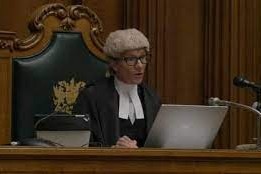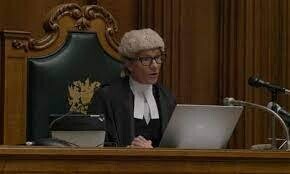
posted 20th November 2023

The home secretary, part of the democratically elected government, wants to ban pro-Palestinian marches through London. She can’t.
The prime minister, leader of the democratically elected government, wants to send asylum seekers to Rwanda. He can’t.
Why not? What is the point of democracy if the government chosen by the people is not allowed to do what it wants?
Suella Braverman was prevented from banning the pro-Palestinian march in London on remembrance weekend because the head of the Metropolitan Police advised her that, as there was no evidence that the march would lead to serious public disorder, there were no grounds in law for banning it. Rishi Sunak was prevented from carrying out his plan to send asylum seekers to Rwanda because the Supreme Court, the highest court in the UK, ruled that, as there was a risk that asylum seekers could be returned to the countries from which they had fled for their own protection, the plan was against the law.
Both these recent (November 2023) cases illustrate how the rule of law works in a democracy. It is something that is often misunderstood. A lot of people think that the government can do whatever it wants. If the government has won a free and fair election, then it is carrying out the will of the people, and nobody and nothing should be allowed to stand in its way. That’s democracy, isn’t it?
Not quite. Democracy does not just mean finding out what people want (or at least what the majority, or more commonly the largest minority, want, as there is never a hundred per cent support for anything) and then doing it. It also means respecting the rule of law. The rule of law means that society has rules. We may not like the rules, but until they are changed, we have to play by them.
To take an analogy from sport. Football has an offside rule. It’s part of the game. If the referee rules you were offside when you scored that goal, it’s not a goal, even if everyone on your team and more than half the fans disagree. And if your response as a player is to abuse and threaten the referee, you get sent off the pitch. So you should be. If referees were to lose their authority, and all decisions were made by majority vote amongst the players and fans, then play would become impossible, and football would be over.
The rules of football are the laws of a country; the referee is a combination of the judiciary, the body of judges who interpret the law, and the police, who enforce the law. So when you hear people angrily denouncing ‘unelected judges’ or ‘biased police', remember the football match.
Referees aren’t elected; they’re appointed. Their job is not to reflect what fans or players want to happen. Their job is to decide if the rules have been broken or not. So too with judges; they are there to interpret the law and decide if it has been broken or not. That decision has nothing to do with what they, or anybody else, wants or doesn’t want to happen. It is determined entirely by what the law says.
The referee also has to enforce the rules. They have the power to award free kicks and penalties and hand out yellow or red cards. So too with the police; their job is to enforce the law by stopping people from breaking the law, and arresting them when they do. But just as referees cannot award a free kick when no foul has been committed, the police cannot arrest someone or stop someone from doing something when no law has been broken, even if lots of people - even if a majority of people - want them to.
The United States was the first democracy of the modern world. One of its founding fathers, John Adams, famously called for ‘a government of laws, not men’. That sums up very well how the rule of law in democracy keeps us safe, and equal, by ensuring that no one can break the rules and get away with it. We are all equal before the law. Everyone, from the highest to the lowest, from the most powerful to the least powerful, has to respect the law. Rishi Sunak might be prime minister and richer than the king, but he still had to pay a fine for breaking the laws on social distancing during the Covid pandemic by attending a birthday party for Boris Johnson in June 2020.
The government can, of course, change or remove existing laws, and introduce new laws. Once they’ve done that, the judges have to interpret the new or changed law, and the police have to enforce it. But until that happens, they - all of us - have to act within the law as it exists.
So, as a debater, you can argue for a change in the law. You could argue for the law on marches or immigration to be changed. But you can’t argue for the home secretary to shut down marches or the government to put people on planes until the law has been changed. Never forget that the government cannot just do what it wants. It has to play by the rules. We all do.





